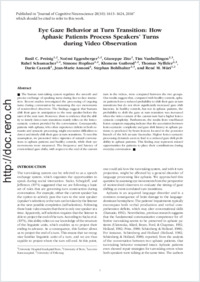Eye gaze behavior at turn transition: how aphasic patients process speakers’ turns during video observation
- Preisig, Basil C. University Hospital Inselspital Bern, Switzerland - University of Bern, Switzerland
- Eggenberger, Noëmi University Hospital Inselspital Bern, Switzerland - University of Bern, Switzerland
- Zito, Giuseppe University of Bern, Switzerland
- Vanbellingen, Tim University of Bern, Switzerland - Lucerne Kantonsspital, Switzerland
- Schumacher, Rahel University Hospital Inselspital Bern, Switzerland - University of Bern, Switzerland
- Hopfner, Simone University Hospital Inselspital Bern, Switzerland - University of Bern, Switzerland
- Gutbrod, Klemens University Hospital Inselspital Bern, Switzerland - University of Bern, Switzerland
- Nyffeler, Thomas University of Bern, Switzerland - Lucerne Kantonsspital, Switzerland
- Cazzoli, Dario University of Bern, Switzerland
- Annoni, Jean-Marie University of Fribourg, Switzerland
- Bohlhalter, Stephan University of Bern, Switzerland - Lucerne Kantonsspital, Switzerland
- Müri, René M. University Hospital Inselspital Bern, Switzerland - University of Bern, Switzerland
-
31.05.2016
Published in:
- Journal of Cognitive Neuroscience. - 2016, vol. 28, no. 10, p. 1613–1624
English
The human turn-taking system regulates the smooth and precise exchange of speaking turns during face-to-face interaction. Recent studies investigated the processing of ongoing turns during conversation by measuring the eye movements of noninvolved observers. The findings suggest that humans shift their gaze in anticipation to the next speaker before the start of the next turn. Moreover, there is evidence that the ability to timely detect turn transitions mainly relies on the lexico- syntactic content provided by the conversation. Consequently, patients with aphasia, who often experience deficits in both semantic and syntactic processing, might encounter difficulties to detect and timely shift their gaze at turn transitions. To test this assumption, we presented video vignettes of natural conversations to aphasic patients and healthy controls, while their eye movements were measured. The frequency and latency of event-related gaze shifts, with respect to the end of the current turn in the videos, were compared between the two groups. Our results suggest that, compared with healthy controls, aphasic patients have a reduced probability to shift their gaze at turn transitions but do not show significantly increased gaze shift latencies. In healthy controls, but not in aphasic patients, the probability to shift the gaze at turn transition was increased when the video content of the current turn had a higher lexico-syntactic complexity. Furthermore, the results from voxel-based lesion symptom mapping indicate that the association between lexico-syntactic complexity and gaze shift latency in aphasic patients is predicted by brain lesions located in the posterior branch of the left arcuate fasciculus. Higher lexico-syntactic processing demands seem to lead to a reduced gaze shift probability in aphasic patients. This finding may represent missed opportunities for patients to place their contributions during everyday conversation.
- Faculty
- Faculté des sciences et de médecine
- Department
- Médecine 3ème année
- Language
-
- English
- Classification
- Biological sciences
- License
-
License undefined
- Identifiers
-
- RERO DOC 305142
- DOI 10.1162/jocn_a_00983
- Persistent URL
- https://folia.unifr.ch/unifr/documents/305924
Statistics
Document views: 117
File downloads:
- pdf: 168
